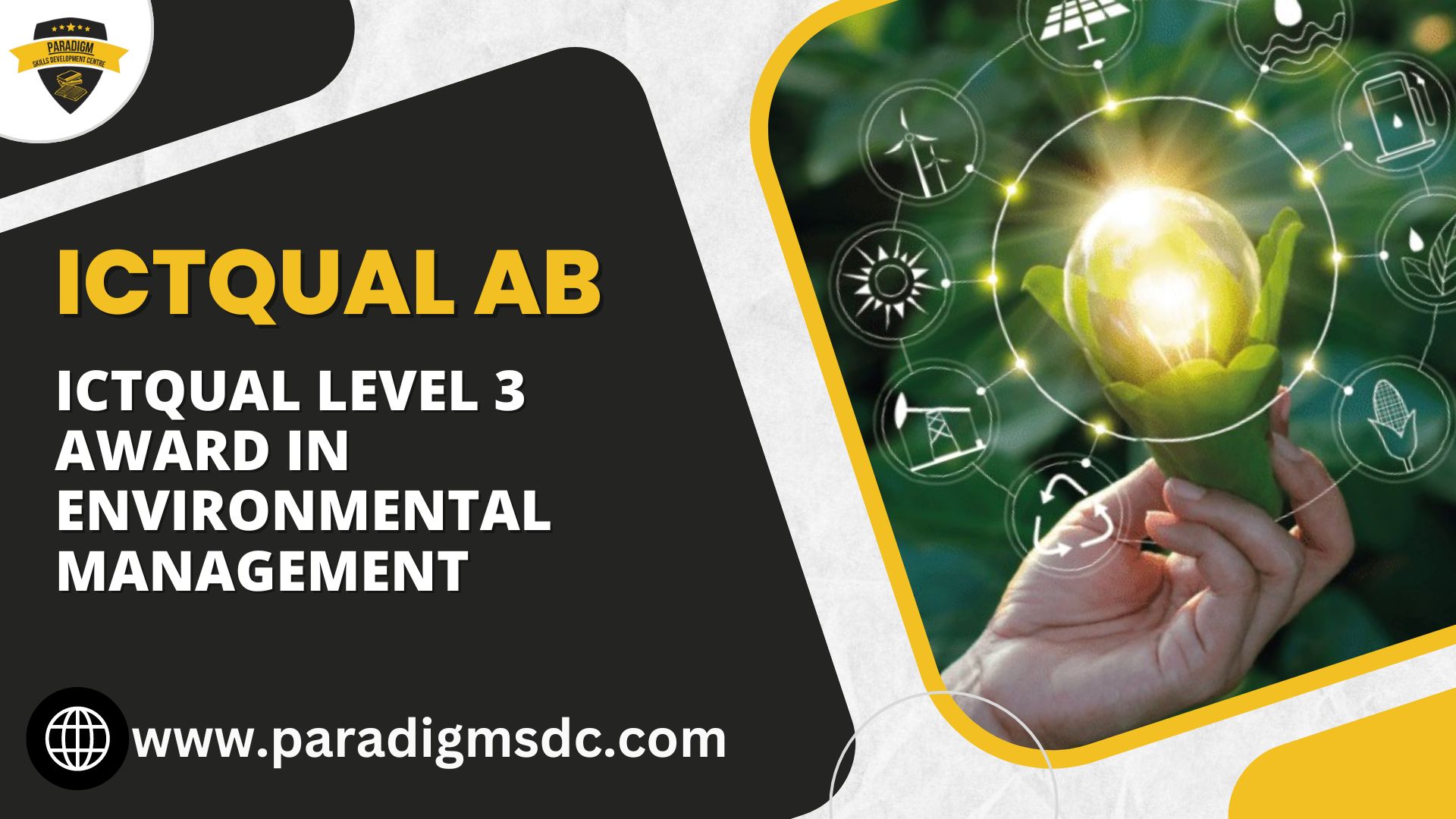Course Introduction
The ICTQual Level 3 Award in Environmental Management is a specialized training program aimed at individuals seeking to enhance their understanding of environmental management practices. This course equips learners with the tools and techniques required to implement effective environmental management systems (EMS) and drive sustainable practices within their organizations.
Course Overview
This comprehensive course covers a wide range of topics related to environmental management. Participants will gain a deep understanding of environmental legislation, sustainability principles, and practical approaches to managing environmental impacts. The course combines theoretical knowledge with practical applications to ensure participants can apply what they learn in real-world scenarios.
Course Study Units
The ICTQual Level 3 Award in Environmental Management includes the following study units:
- Fundamentals of Environmental Management
- Environmental Legislation and Policy
- Environmental Impact Assessment (EIA)
- Waste Management and Pollution Control
- Sustainable Resource Management
- Environmental Monitoring and Reporting
- Corporate Environmental Responsibility (CER)
- Climate Change and Adaptation
- Environmental Ethics and Social Responsibility
Learning Outcomes
Upon completing the ICTQual Level 3 Award in Environmental Management, participants will be able to:
- Fundamentals of Environmental Management:
- Understand the fundamental principles, concepts, and objectives of environmental management.
- Identify key components of environmental systems and their interactions, including natural processes, human activities, and ecosystem dynamics.
- Environmental Legislation and Policy:
- Explain the purpose and scope of environmental laws, regulations, and policies at various levels of governance.
- Analyze the implications of environmental legislation on business operations, resource management, and sustainable development practices.
- Environmental Impact Assessment (EIA):
- Describe the process of conducting environmental impact assessments (EIAs) to evaluate potential environmental effects of proposed projects or activities.
- Apply methodologies for identifying, predicting, and mitigating adverse environmental impacts to minimize harm to ecosystems, communities, and natural resources.
- Waste Management and Pollution Control:
- Evaluate strategies for waste reduction, recycling, and proper disposal to minimize environmental pollution and conserve resources.
- Implement pollution control measures and technologies for air, water, and soil pollution prevention and remediation.
- Sustainable Resource Management:
- Assess the principles and practices of sustainable resource management for renewable and non-renewable resources.
- Develop strategies for sustainable energy use, water conservation, land management, and biodiversity conservation to promote long-term environmental sustainability.
- Environmental Monitoring and Reporting:
- Utilize techniques for environmental monitoring, data collection, analysis, and interpretation to assess environmental conditions and trends.
- Prepare accurate and comprehensive environmental reports, assessments, and management plans to communicate findings and inform decision-making processes.
- Corporate Environmental Responsibility (CER):
- Recognize the role of businesses and organizations in promoting environmental sustainability and corporate environmental responsibility.
- Integrate environmental considerations into business operations, supply chain management, product development, and stakeholder engagement strategies.
- Climate Change and Adaptation:
- Explain the science, causes, and impacts of climate change on environmental systems and human societies.
- Develop adaptation and mitigation strategies to address climate change challenges, enhance resilience, and promote sustainable development practices.
- Environmental Ethics and Social Responsibility:
- Analyze ethical considerations and social responsibilities in environmental management, decision-making, and policy development.
- Advocate for environmental justice, equity, and the rights of present and future generations in environmental decision-making processes and practices.
By achieving these learning outcomes, participants will develop a comprehensive understanding of environmental management principles, practices, and challenges, enabling them to contribute effectively to environmental protection, sustainability, and stewardship initiatives.
Course Benefits
- Enhanced Knowledge: Gain in-depth understanding of environmental management principles and practices.
- Practical Skills: Acquire practical skills to manage and improve environmental performance in various contexts.
- Career Advancement: Enhance your qualifications and open up new career opportunities in the field of environmental management.
- Compliance: Ensure your organization meets environmental regulations and standards.
- Sustainability: Contribute to sustainable development and environmental conservation efforts.
Who is this Course For?
The ICTQual Level 3 Award in Environmental Management is ideal for:
- Environmental professionals seeking to enhance their knowledge and skills
- Managers and supervisors responsible for environmental compliance
- Individuals aiming to start a career in environmental management
- Sustainability coordinators and officers
- Anyone interested in improving their organization’s environmental performance
Future Progression
Upon completion of the Level 3 Award in Environmental Management, participants can progress to more advanced qualifications, such as:
- ICTQual Level 4 Diploma in Environmental Management
- ISO 14001 Lead Auditor Certification
- Advanced courses in sustainability and energy management
By pursuing these advanced qualifications, individuals can further enhance their expertise, take on more significant responsibilities, and drive impactful environmental initiatives within their organizations.
Conclusion
The ICTQual Level 3 Award in Environmental Management is a valuable investment for anyone looking to make a difference in the field of environmental sustainability. With comprehensive study units, practical applications, and a focus on real-world scenarios, this course prepares participants to effectively manage and improve environmental performance, ensuring a sustainable future for their organizations and the planet.
Enroll today and take the first step towards becoming an environmental management expert







